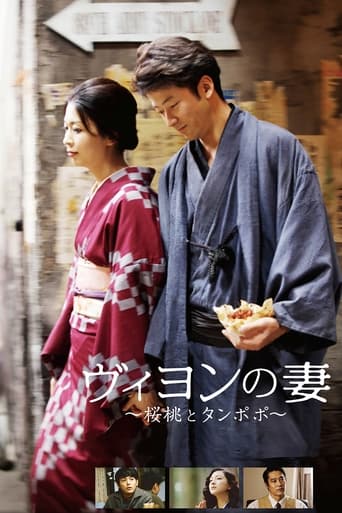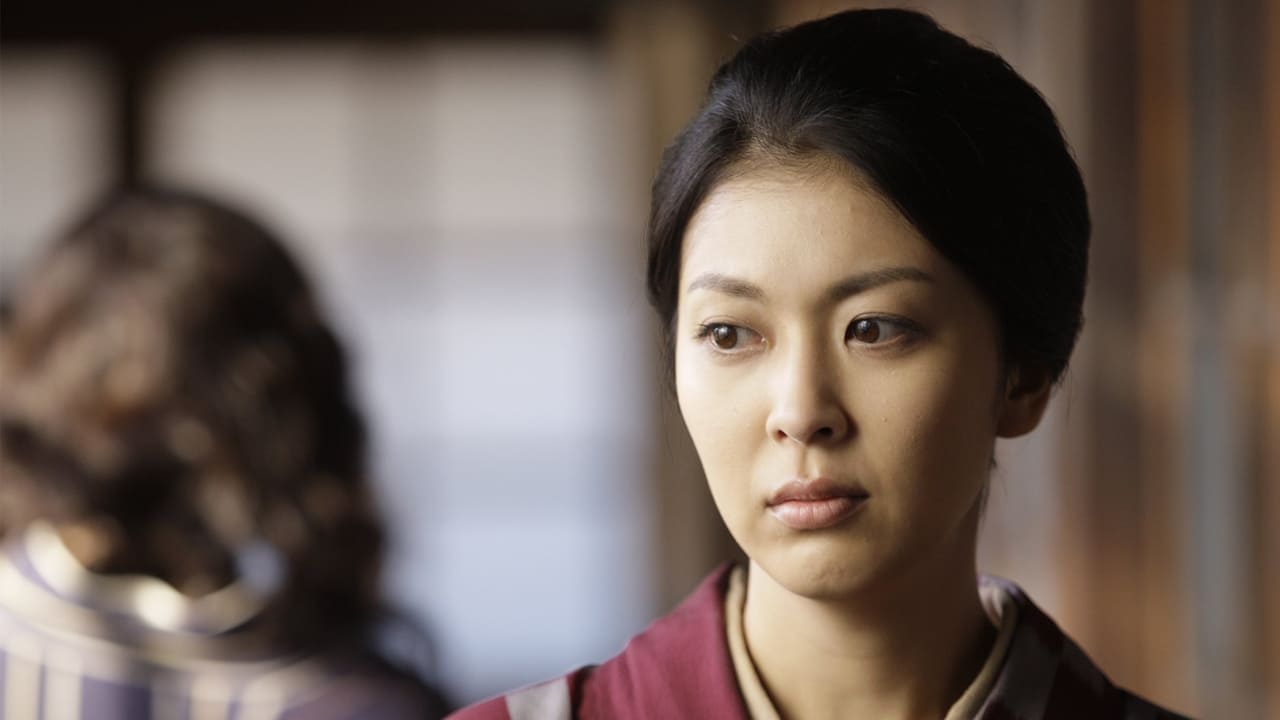ihrtfilms
This is quiet little Japanese film about Otani, a writer with a drink habit and a loving, yet long suffering wife, Sachi. He owes money to a bar and so she goes to work there until the debt is paid back, only to realise that not only does she bring the bar business, she also enjoys working. The money gets paid off and she stays on working and earning money, all the while her husband keeps drinking.Things change however when a young man, a fan of the writer falls for the wife and to add to the story there is a young woman enamored with the writer. Throw in a failed suicide pact and you have quite a drama. Except, despite the potentially heavy story lines, this is handled with a lighter touch. The husband, whilst unfaithful and a drunk actually has some softness to him which makes it difficult to dislike him as clearly the wife thinks. The are brief flashbacks to previous relationships suggesting that perhaps what they have is the best they can have. Because it never become to heavy going, it therefore never becomes emotional and in fact it is quite charming and often funny during much of the film.The two leads are both very good and the film with it's recreation of postwar Tokyo is excellent. Otani, is in any other world a despicable man,but because Sachi has the will power and strength she really has the upperhand and she makes the choices that bind them. This turns the film from a heavy going melodrama to a lighter one and one that shows that sometimes love does endure.More of my review at my site iheartfilms.weebly.com
DICK STEEL
Feminists will find this film being quite exasperating to watch, since the female lead character is a long suffering wife of a self-destructive writer husband, who is left to her own devices to fend for herself, keep her family together, look after their young kid, and to constantly bail her husband out of trouble. Perhaps it's because of the time, set during post WWII Japan, that there's so much uncertainty in life that nobody in the right mind will want to rock the boat on their own family nucleus, where survival is of the utmost importance.The film opens with Otani (Tadanobu Asano) being accused of stealing from the bar of an elderly couple, who had chased him all the way home. His wife Sachi (Takako Matsu) in an effort to provide compensation, offers herself and her time to work at the couple's bar to serve drinks to customers, with the guarantee that she'll work until either her husband returns to pay the couple back, or work until the debt is repaid, which took into account the amount of freeloading that Otani had exploited the couple over the years.And that's not all the negative issues that Sachi has to come face to face with, as Otani seemed to be the husband from hell, making us see absolutely no brilliance of the author he was touted to be, and wonder how long more does Sachi has to put up with her husband's nonsense, which included seeing him with another woman, his attempted suicide with his lover (played by Ryoko Hirosue), his accusation of her betraying him and being disloyal that makes him a cuckolded husband, followed by a stint in jail which Sachi has to bail him out of. It is this last episode that hinted at Sachi's new found independence and discovery of the power she wields over men, as we see that she's attractive enough for a young boy to proclaim his infatuation for her, and a rich lad at that too, providing that level of financial security I guess most would jump at during the time, and leaving the audience guessing whether she did or did not do the deed with an ex who's now a lawyer in her quest to get her husband out of jail.Based upon the short story of Osamu Dazai's, Villon's Wife is as the title stated, an examination of that feminine character and her trials and tribulations during a period of grave uncertainty, brought to life by the excellent art direction and production sets that transported us back when American GIs first set foot on Japan. Credit goes to the two leads Asano and Matsu as the husband and wife in the film, as both bring out excellent performances and made the plot rather engaging to sit through, nevermind that most times you'd wonder if this was in the modern context, the wife would have walked out already. Takako Matsu especially impressed in her role as Sachi, showcasing her character's mettle and steely determination to get through her ordeals unscathed and with dignity, celebrating self-reliance and survival instincts during times of hardship.
cucina
This is an engrossing, well made and well acted film.There is, however, a static quality to it that quickly becomes tedious. Within the first five minutes you know everything there is to know about the two lead characters: at the end of the film they are exactly the same. The husband, superbly played by Asano Tadanobu, is a spoiled, selfish, deceitful and self-pitying alcoholic writer. His beautiful and passive wife, played by Matsu Takako, is loving, forgiving, accepting and, ultimately, masochistic.Both these characters are prototypes: the tortured artist and the self sacrificing, long suffering wife. At times his overwhelming lack of basic decency is almost comical. And her ever present gentle smile and gracious acceptance of his sadistic behavior and treatment -- not only of her, but of their child -- makes her increasingly appear not as an admirable woman but an enabling fool.As the emotional abuse and mistreatment accumulate, the entire plot focuses on a single, simple question: will the wife at least acknowledge to herself the demeaning and brutal reality of her marriage, or will she continue to smile and accept her monster of a husband. The smile wins.
Harry T. Yung
The setting is post-war Tokyo. The male protagonist is an eccentric young (thirtyish) writer obsessed with two notions: death and being cuckolded.The plot is simple but not without some interesting features, starting with the pathetic writer Otani running home (comprised of wife and 2-year-old son) half-drunk, after stealing 5000 yen from a small eatery, with the owner couple hot on his tail. That leads to the demure, devoted wife Sachi volunteering to work in the joint as "hostage" until the money can be paid back. As the story unfolds, the wife is delighted with find that her natural endearing charm immediately makes her the darling of the patrons who lose no time getting into a one-upmanship contest of giving her the largest tip (which the generous owners allow her to keep). At this point, the movie appears to take the route of a slightly off-beat comedy.More then is revealed about the husband, as a womanizer who manages to seduce every desirable woman that comes his way, including the wife of the owner of the joint. One of Otani's admirers, Akiko, has taken the obsession such an addictive extent that she has lost everything for him, and now comes to the joint most night to get drunk and hope to run across him. Further revelation comes with Sachi's change encounter with her girlhood sweetheart, now an established lawyer. The irony is that they broke up because during their deprived days, Sachi was caught shoplifting a scarf for his boyfriend, who deserted her when she was arrested while Otani, a strange, came to her rescue. Equally ironic is that Otani stole the 5000 yens so that his wife and child can have a good Christmas, a crime committed with similar compassionate motivations.The story meanders around these relationships until it takes a decisive turn, when Otani and Akiko come to a decision of committing suicide together. The episode is handled with black humour, but has grave consequences. Both survive, but Otani is charged with attempted murder of Akiko.It seem that in this semi-autobiography of Osamu Dazai (who actually killed himself two years after the story of published), the character Otani was custom-made for Tadanobu Asano whose work in the Asian cinematic world are too many to mention ( Last Life in the Universe, Café Lumiere, Zatoichi, Invisible Waves, Our Mother). Similarly for Takako Matsu as Sachi, the saintly enduring wife and mother. Ryoko Hirosue, who seems to be getting more versatile every time she appears on screen, gives a mesmerizing portrayal of beautiful, enigmatic Akiko.


 AD
AD


